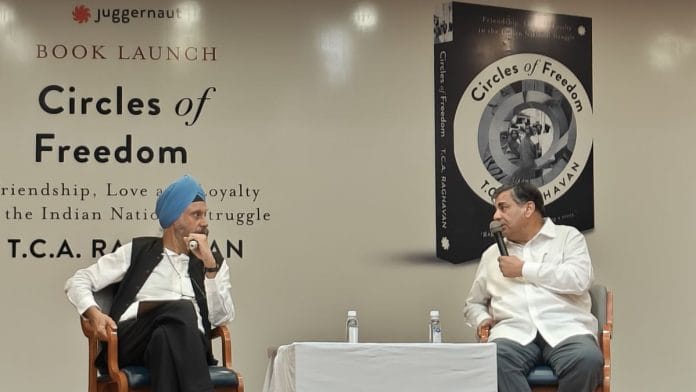New Delhi: Syed Hossain and Vijaya Lakshmi Pandit’s love affair was a major source of tension for Motilal Nehru. He had to call Mahatma Gandhi to convince the couple to part ways. The eloping resulted in Hossain being exiled to Cairo, Egypt in 1919, where he breathed his last.
This and other such interesting nuggets about a group of people part of the Independence struggle came up at the recent launch of Circles of Freedom, a Juggernaut Books publication, at the India International Centre in New Delhi.
In Circles of Freedom, diplomat-turned-historian TCA Raghavan gives a tangential view of the events around the freedom movement. The book chronicles the story of five young people – three young Muslim men and two fierce women – whose paths intertwined during the struggle for Independence, and how the resistance affected their personal lives. The central character of the book, however, remains lawyer and freedom fighter Asaf Ali.
“It is the view of the attendant lords, the courtesans, who witnessed everything, understood it but also believed things could be done in a different way: A view of large events from the periphery gives you greater, more interesting stories,” the author said about his new work.
Circles of Freedom is a history book but not exactly a historical account of the freedom movement, Raghavan told former diplomat Navtej Sarna at the beginning of the discussion, which saw politicians, journalists, diplomats, authors, history enthusiasts, as well as Raghavan’s family and school and college friends.
Extra chairs had to be arranged to accommodate an audience of nearly 150 people, which included senior Congress leader Jairam Ramesh, former diplomat and IIC president Shyam Saran, columnist C Raja Mohan, and journalist AK Bhattacharya.
Love, friendship, freedom
Revolving around the lives of Sarojini Naidu, Asaf Ali, Syed Hossain, Syed Mahmood and Aruna Asaf Ali, the book highlights instances of love and friendship within the circle. A significant part of the book talks about Asaf and Aruna’s relationship, and how their marriage was affected after Asaf went underground to escape arrest during the freedom struggle.
“My book also encapsulates the Left and its contribution to some extent,” said Raghavan.
Aruna’s approach to the freedom struggle embodied the Left. She was much younger than the rest of the lot and quite radical. She was vocal and wanted quick results as opposed to the “Gandhian way” of resistance.
This stance created cracks in her marriage with Asaf, who was a major Gandhian.
On why he chose this specific group of friends, Raghavan cited a letter written by Naidu in London, which mentioned two of her friends, Asaf Ali and Syed Hossain, who did almost everything together.
“I thought, why not follow this story?”
Also read:
Jinnah was quite the ‘role model’
Through chapters in Circles of Freedom, as well as during the book discussion, Raghavan emphasised how his work was also about three Muslim young men without a conventional idea of nationalism who joined the freedom struggle.
Sarna then brought the author’s attention to Muhammad Ali Jinnah’s mention in the book.
“While he was not necessarily a part of the group, he was very close to Asaf Ali,” said Raghavan.
He added that, before demanding a separate country, Jinnah was quite the ‘role model’ for many young Muslims. He was educated, liberal in his thoughts, and dedicated to the cause of Independence.
The audience became glued to their chairs when the conversation veered toward Hossain and Pandit’s romance.
“If Gandhi and Motilal Nehru were so mad and interfering in the case of Syed Hossain and Vijaya Lakshmi Pandit, forcing them to take a divorce, why did they not react to Asaf and Aruna’s marriage?” asked an audience member.
The author replied with a smile, “I think they didn’t have a choice”.
Raghavan and Sarna also discussed the Khilafat movement, highlighting how initially, it was seen as only a Muslim struggle. It was with the intervention of Gandhi that it started to be perceived as a bigger movement that could potentially unite Hindus and Muslims.
The sale counter set up outside the hall soon flooded with people eager to buy the book.
“It is rare to witness such a hearty discussion in the field of history. I am glad I came to the event and got a chance to meet Mr Raghavan,” said Rose Kesarwani, a first-year Sociology student at Delhi University’s Hindu College.
(Edited by Zoya Bhatti)







Motilal Nehru failed miserably when it came to his own children. His political and legal pursuits left him with no time to focus on his children. The result is that both of them ended up being loose characters.
Sarojini Naidu has always had a very bad reputation for multiple affairs and escapades. Even getting caught red handed did not serve as a deterrent. Such was her addiction to flings. People like her ruined the image of Bengal and Bengali society. From being looked up to as a progressive society they became looked down on for all kinds of sleaze and illicit activities.